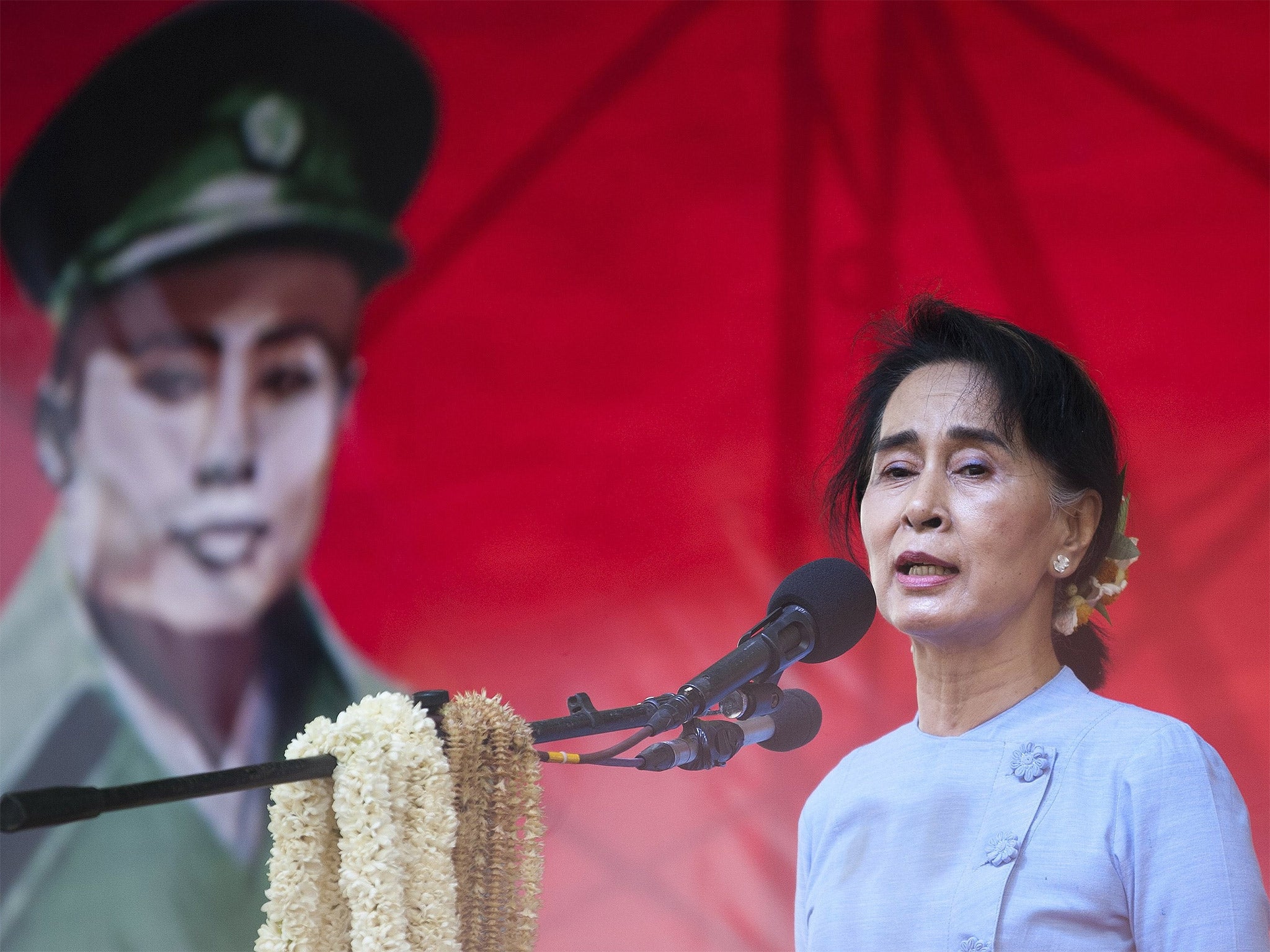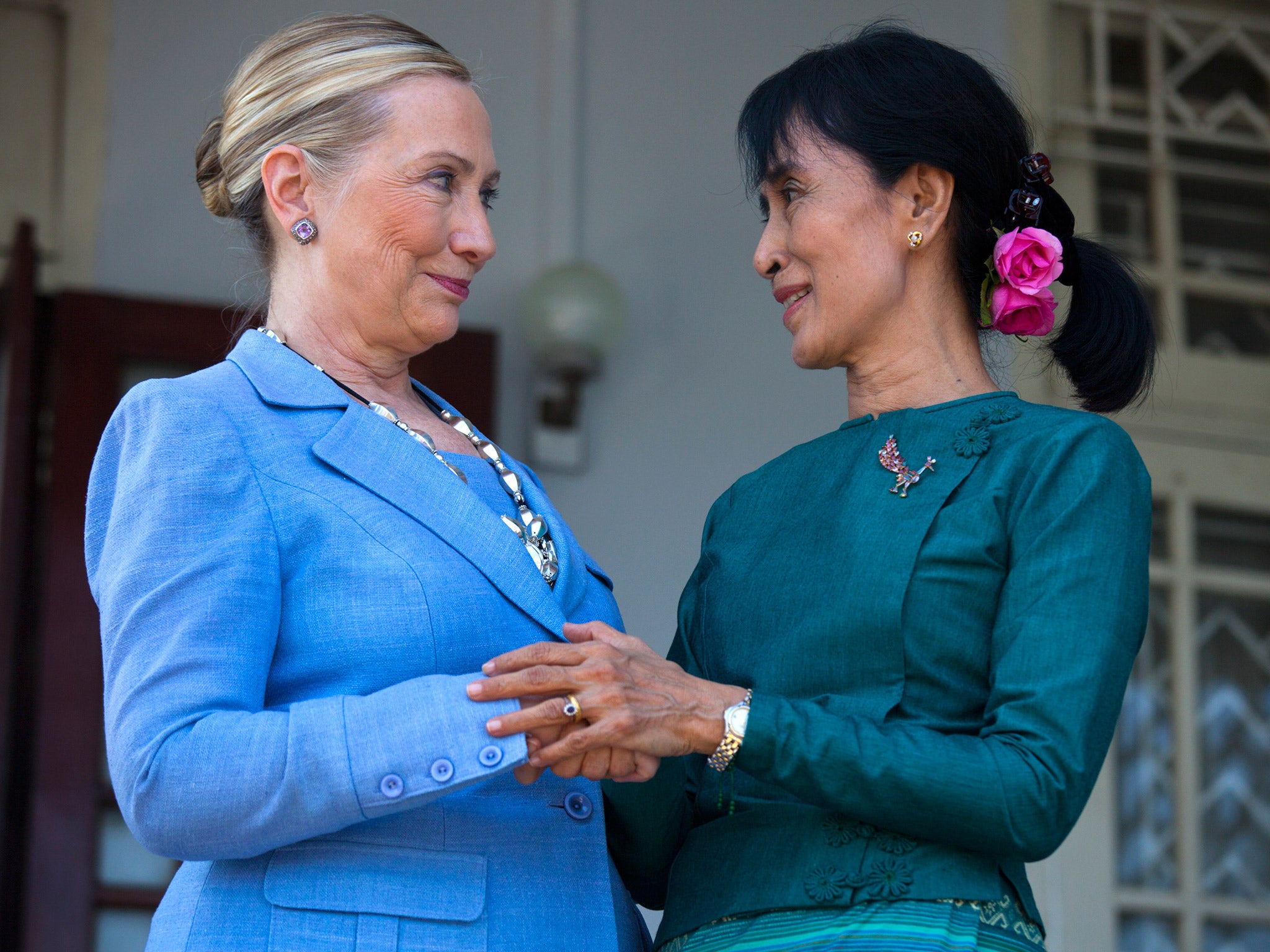Burma election: China tries to woo opposition leader Aung San Suu Kyi ahead of poll
Could her visit to Beijing signify an unlikely alliance with the People's Republic?

Your support helps us to tell the story
From reproductive rights to climate change to Big Tech, The Independent is on the ground when the story is developing. Whether it's investigating the financials of Elon Musk's pro-Trump PAC or producing our latest documentary, 'The A Word', which shines a light on the American women fighting for reproductive rights, we know how important it is to parse out the facts from the messaging.
At such a critical moment in US history, we need reporters on the ground. Your donation allows us to keep sending journalists to speak to both sides of the story.
The Independent is trusted by Americans across the entire political spectrum. And unlike many other quality news outlets, we choose not to lock Americans out of our reporting and analysis with paywalls. We believe quality journalism should be available to everyone, paid for by those who can afford it.
Your support makes all the difference.Aung San Suu Kyi has travelled widely since her election to Burma’s parliament in April 2012, but no visit is more significant than her first-ever trip to the People’s Republic of China, which begins on Wednesday.
She has already visited Japan, South Korea and Taiwan, meeting its political leaders, and a visit to Beijing has been spoken of by the Chinese in the past as a possibility, but last weekend’s announcement of a four-day visit came out of the blue. She is expected to meet President Xi Jinping and the Prime Minister, Li Keqiang.
The timing is highly significant. Burma is due to hold general elections in late October or early November – the date has yet to be announced – and for Suu Kyi’s National League for Democracy (NLD) it will be the most important test in the party’s history.
As a symbol of democracy challenging and humiliating autocratic power, Suu Kyi has long been a problematic figure for the leaders of the People’s Republic. I know this to my cost. The Chinese translation of my biography of Suu Kyi, The Lady and the Peacock, has sold well in Taiwan since its publication nearly three years ago. A small, brave publisher in Beijing decided it would try to replicate this success in the mainland, translating the book into simplified characters.
They explained to me via my agent that there would need to be some cuts. I visited their office in Beijing two years ago and met their youthful team and we discussed the sort of changes that would be needed. Hostile references to China would have to go; but their anxiety over the word “communism”, and to mentions in the book of the fact that Suu Kyi’s uncle had been a leader of Burma’s communist party, were difficulties I hadn’t expected. We parted on friendly terms but without any concrete agreement on changes. I prepared myself for a long session of haggling.
But five months after Mr Xi’s election to the presidency, I received a letter from the Beijing publisher, informing me regretfully that the book “doesn’t go through General Administration of Press and Publication’s review in our territory… the new government is very restrict to the publication project and the publisher have to give up this book now [sic].”
It wasn’t a big surprise. There is almost nothing in Suu Kyi’s CV that could possibly appeal to Beijing: a woman among political men, a democrat of vast popularity among generals and ex-generals; educated and long resident in the liberal West; the widow of a Tibet scholar; a friend of American politicians from the Republican hardliner Mitch McConnell via George and Laura Bush to Hillary Clinton and President Obama… the list goes on and on.

Most disagreeable of all to Beijing, however, is the fact that she symbolises the most profound shift in Burma’s geopolitical posture for 30 years, and did more than any other individual to make it happen: Burma’s decisive move, three years ago, out of China’s orbit and into that of the West.
In common with its South-East Asian neighbours, the proximity of giant China has always been a fact of life that Burma’s rulers ignored at their peril. Conversely, Burma has “always been of utmost strategic importance” to China, as Burma expert Bertil Lintner puts it. “It is China’s gateway not only to South-east Asia but South Asia as well.”
In the early years of Burma’s independence, its fledgling democratic government was shaken to its shallow roots by a Chinese-backed insurgency, set on overthrowing it by force and replacing it with a compliant Maoist regime. The communists dug in a mere 60 miles north of Rangoon, in the hills of the Pegu region, resisting government attacks for many years, while up on the north-east border with China’s Yunnan Province, many thousands died in a bitter war between the Burmese army and the Communist Party of Burma that only began fizzling out with the death of Mao and the rise to power of Deng Xiaoping in 1976.
With Deng’s emergence the priorities changed from conquest by force of arms to colonisation by commerce. After the West imposed sanctions to show its distaste at the junta’s brutal crackdown on demonstrating students, China moved smoothly into the breach.
Over the following years they cemented the relationship, building roads and big dams and copper mines and extracting timber and much else. Masses of illegal Chinese immigrants crossed the porous border, and Chinese money bought up swathes of Mandalay, to the disgust of Burmese residents who could no longer afford to live there.
Whether inciting revolution or taking over a country’s economy or (as in the present South China Sea impasse) staking arrogant claim to waters which other, smaller countries have a more obvious right to, China is a juggernaut that is hard to stop.
But Thein Sein, the ex-general who became Burma’s President in 2011, devised a practical way to do so. By establishing a working relationship with Suu Kyi, freed from house arrest a few months before, and following up with a raft of liberal reforms, including freeing political prisoners and loosening censorship, he quickly persuaded the US and the European Union that Burma was again open for business on Western terms. Even before that he had sent a clear warning to China that the times were changing, suspending work on a big dam being built by China on the headwaters of the Irrawaddy River. He did so after Suu Kyi joined the movement protesting against the dam.
As a result of all this, relations between China and Burma today are no better than frigidly correct. And the embers of the old Chinese-backed revolutionary war in the north-east have flared up again in a way that is bound to raise the suspicions of the Burmese military: an ethnic Chinese warlord, Peng Jiasheng, has returned to his former stronghold on Burma’s border with China, and fierce fighting between his ethnically Chinese army, known as the Myanmar National Democratic Alliance Army, and the Burmese has cost the lives of hundreds of Burmese soldiers since February. Breaking out when President Thein Sein was staking his prestige on signing a nationwide ceasefire with all the major ethnic armies, the timing was highly suspicious.
China denies having any hand in the violence, and blames Burma for allowing its fight against the rebels to spill over the international border. It is reportedly preparing to stage live-fire military drills near the border battle zone to bring pressure to bear on the Burmese army. And Suu Kyi is part of the same strategy – making life uncomfortable for President Thein Sein, the architect of Burma’s pivot to the West, by rolling out the red carpet for his most potent rival.
As the Chinese know, Suu Kyi retains her hold over the affections of the great mass of Burmese. She is not eligible to run for President, on account of the constitution she has been trying vociferously to amend, but she is likely to emerge from November’s election as one of the two or three most powerful figures in the country.
What happens after that is anybody’s guess. But doubtless President Xi would like Suu Kyi to know he cares.
Join our commenting forum
Join thought-provoking conversations, follow other Independent readers and see their replies
Comments